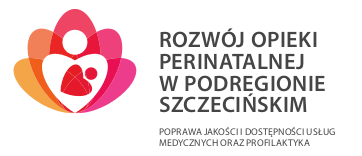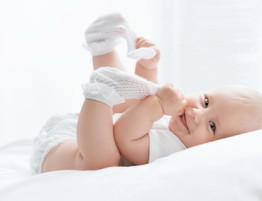NEURODEVELOPMENTAL STIMULATION
Detection of neurodevelopmental disorders constitutes a significant factor in organizing care over a preterm neonate. Recognizing such disorders may pose a difficulty, which is why observation by parents and medical personnel plays such an important role. We evaluate the child’s position, muscle tone (decreased tone – hypotonia, or increased tone – hypertonia), sucking disorders, eyeball movement.
When assessing the neurodevelopmental condition we need to determine:
- what the child’s level of development is in relation to its calendar age,
- what neurological irregularities occur in a child.
Early detection of children with delayed psycho-motor development means that psychomotor development stimulation is started more quickly. A suspicion or determination of a delayed psychomotor development in a neonate is an absolute indication for commencing rehabilitation of the disturbed functions. A physiotherapist should provide preliminary instructions, irrespectively of the fact whether the baby will need specialist treatment in the future or not.
These visits involve a control of correct head position, control of the head in support, eye-movement coordination, control of speech and social contacts.
The instructions include:
- proper lifting and carrying of the child, taking into consideration the prevention of improper reflexive activity and stimulating proper motor patterns,
- proper feeding positions with correct tension distribution,
- proper position during play and rest.
A physiotherapist is obliged to assist the parents of the children he or she is working with. A physiotherapist ought to suggest the baby’s parents the best position for carrying and laying down the child. Parents should be informed and taught how to conduct play with their child in order to develop its motor and intellectual sills without causing improper motor patterns and posture patterns. Activating the child in the improper manner will trigger limitations in its movement.
The first abnormal symptoms of motor development in children typically concern a delay in or lack of head lifting, meaning the child’s acquisition of head control. Then the incorrect development of movements in other parts of the body ensues. The child positions itself improperly, usually asymmetrically, straightening or bending excessively.
Advanced specialist care recommends neurodevelopmental therapy – Bobath and Vojt’s methods, which offer precisely refined techniques supporting motor development and thereby supporting baby’s development.
The Peto method, Conductive Education and W. Scheborne method emphasize child’s psycho-pedagogical competences. Irrespectively of the form of undertaken rehabilitation, care over a premature baby is a process requiring extensive knowledge and patience. Any stimulation undertaken always ought to be linked to activity, play, without causing excessive strain, stress, fear or pain. All therapeutic activities are chosen for each child on an individual basis.




